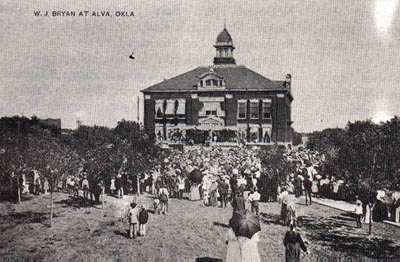|
Moderated by NW Okie! |
Volume 14 , Issue 272012Weekly eZine: (366 subscribers)Subscribe | Unsubscribe Using Desktop... |
The Great Commoner - Wm. J. Bryan

Remembering back to William Jennings Bryan's visit to Alva, Oklahoma when Bryan drew a large crowd on the west Courthouse lawn, in downtown Alva, M (Woods) county, Oklahoma Territory when he stumped the state to urge the adoption of the proposed State Constitution.
William Jennings Bryan was also trying to gain support for the Democratic ticket of 1907. He praised the proposed Constitution by declaring it "One of the great documents of modern times." Bryan assured his audience that it was "The best Constitution today of any state in the Union."
William Jennings Bryan fused Populist rhetoric and policies with a new Democratic coalition as he became on of nebraska's and the nation's favorite sons. But he was not born in Nebraska. Bryan was born in Illinois in 1860. His father was a lawyer and local politician. Both of his parents were intensely religious, and young William shared their fervor. At the age of 12, he joined the fight for prohibition of alcohol by signing a temperance pledge for school. After high school, he attended law school in chicago and worked in the office of Lyman Trumbull, Abraham Lincoln's friend and a U. S. Senator. Shortly after Bryan began is own law practice, he married Mary Elizabeth Baird.
Just three years after coming to Nebraska, Bryan decided to run for Congress as a Democrat. He was a long shot. No Democrat had ever been elected to congress in the 20 years of statehood. But Bryan had realized that common people were in desperate financial times, and the Populist Party was probably at the height of its popularity. Bryan picked up some of the ideas as the populists. he won the election and became the first Nebraska Democratic Congressman. Bryan won a second term in Congress in 1892.
It was in 1894, that Bryan to run as a candidate for U. S. Senate. But the Republicans were back in control of the Nebraska State Legislature and they elected a railroad attorney for the Senate seat. This is when Bryan became editor of the Omaha World0Herald, a Democratic paper. His writings kept his name and ideas before the public as he traveled the Chautauqua lecture circuit.
In 1912, Bryan helped Woodrow Wilson win the presidency and Wilson named Bryan Secretary of State. He served for two years, negotiating peace treaties with 29 nations. He also helped Wilson push through a series of domestic reforms known as the "New Freedom" measures.
He turned his attention to other issues, saying that the three great reforms of the 1920s would be peace, prohibition and women's suffrage. His support was significant in passing the latter two causes. At the end of his life, he was more and more concerned with religious issues and he became even more famous for his prosecution of the Scopes monkey trial. He argued against the teaching of evolution. Five days after the trial ended, Bryan died in his sleep in Tennessee.
| View or Add Comments (0 Comments)
| Receive
updates ( subscribers) |
Unsubscribe
| © . Linda Mcgill Wagner - began © 1999 Contact Me | |
